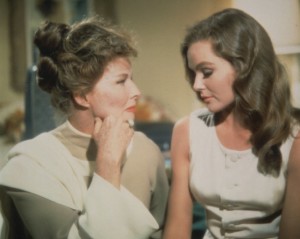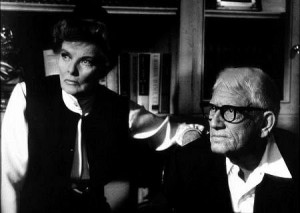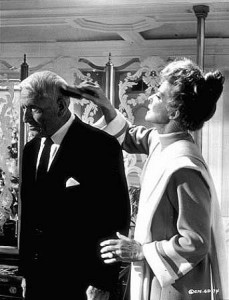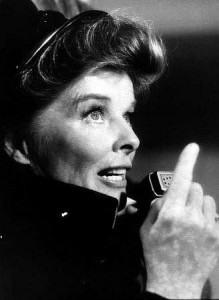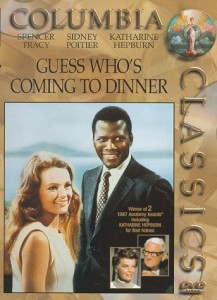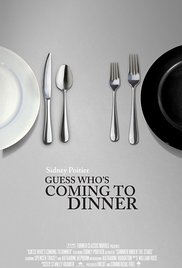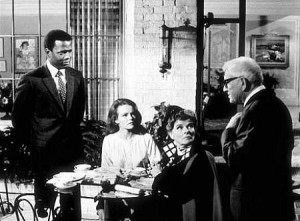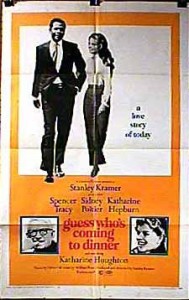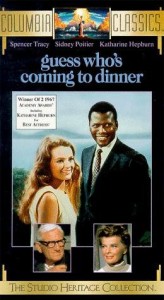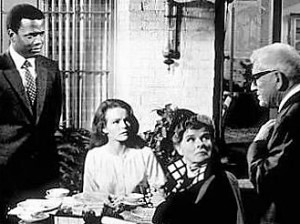Guess Who’s Coming to Dinner **** (1967, Spencer Tracy, Sidney Poitier, Katharine Hepburn, Katharine Houghton) – Classic Movie Review 3421
Producer-director Stanley Kramer’s 1967 old-fashioned drawing room comedy drama is impeccably liberal minded and well meaning but it stirred up controversy by standing accused of patronising African Americans. Good hearted as it is, it was always slightly awkward and uncomfortable and now is dated so it is more awkward and uncomfortable.
However, accepted as a movie of its time, now it can be chiefly celebrated for the good acting chances it provides for Spencer Tracy (in his final role) and Katharine Hepburn, who are seen on around their best, Oscar-worthy form. Seeking, and finding, a popular audience, William Rose’s screenplay firmly intends to be character led rather than issue driven and Kramer tries hard to keep it that way too.
Katharine Houghton (who is Hepburn’s niece, playing her daughter) stars in her debut as Joey Drayton, who shocks her rich West Coast liberal parents Matt and Christine Drayton (Tracy and Hepburn) by announcing that she is planning to marry African American Dr John Prentice (Sidney Poitier).
After holidaying in Hawaii, Joey returns to her parents’ San Francisco home, bringing her fiancé, the highly qualified Dr John, to introduce him to her mother, who owns an art gallery, and her newspaper publisher editor father.
A sick Tracy seems to eat up his role effortlessly, conjuring up a charismatic version of his crusty but nice role as the dad in Father of the Bride. Hepburn is a delight, and won a Best Actress Oscar (her second, and the first since 1934 for Morning Glory, though there were eight nominations in between) while Tracy was nominated as Best Actor posthumously. He was beaten by Rod Steiger for In the Heat of the Night (1967). Tracy won the Bafta for Best Actor. He died 17 days after filming was completed. It was the pair’s the ninth and final film together.
Of course the scandal is that, with the film’s 10 nominations, Poitier wasn’t among them, overlooked like he was with In the Heat of the Night (1967). However, Poitier had become the first African American to win the Best Actor Oscar for Lilies of the Field (1963) – the only one until Denzel Washington for Training Day (2001), 38 years later. Washington won the Best Actor award the same night Poitier received an Honorary Oscar ‘for his extraordinary performances and unique presence on the screen and for representing the industry with dignity, style and intelligence.’
Guess Who’s Coming to Dinner is way too sentimental and cosy, and yes, awkward, uncomfortable and patronising, and Poitier’s character does seem too much of a saint or at least a flawless, upright pillar of the community to be actually a real person.
However, the movie is literate, entertaining and its heart is in the right place. The public lapped it up and the Hollywood folk liked it too, enough to give screen-writer William Rose an Oscar for best original story and screenplay. There were eight further Oscar nominations: Cecil Kellaway (as the couple’s priest, Monsignor Ryan) and Beah Richards (as Poitier’s mom, Mrs Prentice) were nominated for best supporting actor and actress; and Kramer was named for best director and picture.
Also in the cast are Roy E Glenn Snr, Virginia Christine, Roy Glenn, Isabel Sanford, Alexandra Hay, Barbara Randolph, D’Urville Martin, Tom Heaton, Grace Gaynor, Skip Martin and John Hudkins.
Hepburn is the only movie star to win four Oscars – Morning Glory (1933), Guess Who’s Coming to Dinner (1967), The Lion in Winter (1968) and On Golden Pond (1981).
© Derek Winnert 2016 Classic Movie Review 3421
Link to Derek Winnert’s home page for more reviews: http://derekwinnert.com/

